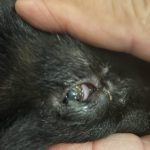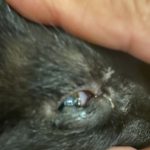Hello,
I am so sorry for you and your dog. I’m sorry that you both had to go through this and I’m also sorry that they made a terrible situation worse. My blog wasn’t intended to be about cruelty, although yes I do mention it happens, but tether my difficultly in knowing what’s best and how to serve my patients first and foremost. I don’t know what kind of advice to give you. I will tell you that we created the storylines section (the tab for it is above) so that anyone and everyone can share their pets experiences so other may benefit. There are also multiple facebook groups dedicated to pursuing malpractice in vet med. maybe they can help.
Again I’m so sorry. It’s not fair and it’s not right. I’m not saying that medical complications don’t and can’t happen b. I am saying that no one should be bullied, yelled at or made to feel anything other than valued and appreciated when they seek help for their pets.
HELP!!
I have a 3yo female Pom, Nomi, who is bullying our newly adopted female puppy, Ali.
Backstory: We had a senior Beagle (who recently passed away) and our current 3yo Pom. They got along very well tho the beagle was not in to playing with toys, he would play “wrestle” with Nomi. Nomi never had any aggression toward him (other than don’t go after my food) but she did like to boss him around….stay out of the garbage, don’t lick the dishes when the dishwasher is open sort of stuff. As said, our Beagle recently passed and we just (like yesterday) adopted a puppy, wanting to give Nomi another companion. Nomi is bullying the new pup; will not allow her to play with the toys…(.and we did buy new toys as we knew not to just give Nomi’s toys up for grabs)….will not allow her play freely, nips at pup if she makes sudden movements around her. Normally, Nomi is a very social dog with humans but has never been around dogs other than her beagle brother who was already here when Nomi came to us at 12 weeks old.
I need to know how to calm Nomi down and teach her it is ok for the new pup to play both with toys and in general. I need to know how to effectively “discipline” Nomi when she is mean to the pup without using tactics such as striking her or yelling. I have been giving her lots of praise in the moments when she doesn’t nip or growl at the pup, even treats. We’ve been very cautious to make sure we show Nomi affection right along with the new girl and we do not leave them alone together, and do not feed them together.
ANY help/advice would be so welcome as we want these two girls to get along and be pals for their sake and ours!
Comments
Four years ago this week, my dog Connor was released from a Baltimore-area veterinary orthopedic and sports medicine hospital after THREE failed TLPO surgeries and multiple significant infections, which created the beginning of Connor’s end. The reminders of this are coming up daily in my Facebook “Memories” feed, which is why I’m currently wrestling with taking action four years after the fact. Connor completely tore his CCL and the ortho surgeon sold me–HARD–on TPLO for him. This same practice and surgeon had successfully repaired a torn CCL for another of my dogs, Tessa, when she was five and a half years old. Connor was 13, and the surgeon was all but guaranteeing success, citing examples of 12-year-old Great Dane patients who regained great quality of life and movement. Connor fell off a ramp getting out of our car and three of the six screws broke after the first TPLO surgery. The surgeon did a second TPLO surgery, after which Connor went NOWHERE and did NOTHING, and the screws failed again. Plus, the second time, he developed an infection so bad I mistook the stench for a sewer problem I was having in my house. When the vet intern cut off his splint and dressing, what was inside was bright green and smelled horrendous. I’d been mistaking Connor’s crying and balking as stubborness, not recognizing he was in PAIN. The staff whisked Connor away to the back and kept him for more than a week. MONTHS later, one of the vet techs told me they weren’t sure he was going to make it that first weekend (our appointment was Saturday; while they were typically closed on Sunday, they had this staffer with him around-the-clock, doing regular debriding they didn’t tell me about). The third surgery involved an external fixator I was cleaning multiple times a day. When they found out I was doing this, I was yelled at and told to only clean it once a day. I followed the directions–and another significant infection developed. There were multiple instances of their applying splints in ways that hurt my dog, and I ultimately had to move him to another veterinary ortho practice because the surgeon who performed the surgery, the vet who owned the practice and finally the office manager (who had been the final person who would even respond to my calls and letters) stopped responding. Second and third opinions were that Connor developed a bone infection so severe he might not recover–because a fragment of screw had been left behind from one of the first two surgeries. He ruptured a disk in his back trying to manage the awkward splints the first ortho vet used. The second ortho vet did an MRI–discovering the TWO ruptured disks (one was several years old and had been misdiagnosed by the original vet ortho and sports medicine practice as a “congenital defect”). I went ahead with the spine surgery–within three hours in recovery, Connor pushed the baby-gated pen he was in around a corner. The second surgeon was amazed, and said to me, “Younger dogs who recover perfectly well from this surgery can’t even stand at this point–Connor is rearranging the furniture. I can’t imagine how much better he must feel right now to be doing that.” But the leg wasn’t healing due to the infection, and I finally conceded that, despite my best intentions to give him back his mobility and his life, the decision for TPLO actually made his last year of life miserable and then forced me to put him down. (And I can’t even tell you about the in-home “euthanasia” service–it was so horrible I still weep thinking about what happened there, more than three years later.) With this brief (really!) background, would it be unreasonable of me to file a complaint with the state veterinary licensing board? It’s only now that I realize THEY made mistake after mistake, didn’t fully advise me of the situation and options, and caused me to put my dog through pain and misery that wasn’t going to help him improve. I’ve been really fired up about this complaint this week, but then I read your blog about euthanasia and how clients can be unreasonably cruel, and I need to know if you think there would be anything gained from the practice having to answer for their decisions (which include blaming me and refusing to talk to me or treat my dog until I fully paid them ongoing bills that were supposed to have been covered under the “guarantee” they provided in writing.) I really appreciate your taking the time to read this long post and offer your advice.
Comments
my 7 year old dog, we aren’t sure of breed, but we think a lab/beagle mix of some sort experienced extreme pain and loss of the use of his back legs 2 days ago. I immediately took him to the emergency vet. They told us med management and cage rest. They brought him to the car with the use of a sling for his hind legs stating he still had some movement of his hind limbs intact. 2 hours later I believed he had declined and had no use. I called back to the vet who made me feel guilty for asking for further evaluation stating she would not put a dog through an MRI and surgery that still exhibited neurological function. He cried all night long and every time I moved him to potty was in excruciating pain. he wouldn’t eat and no longer could void. I took him back to the vet the next morning where he received an MRI and underwent surgery for a ruptured disc. at that point he no longer had deep pain sensation. My question is did that delay diminish his chances of recovery? and what are the odds now? I’m just heartbroken for him and do not want him to suffer. I am a nurse practitioner and very willing to provide the care he needs however I don’t want him to be in long term pain or have a poor quality of life.
Comments
So i have a kitten, he is presumably 3-4 weeks old found in a walmart parking lot, and he has lice, taking him to the vet as soon as possible, but im wondering what the best way to get rid of them at his age is? we are currently trying diatomaceous earth and coconut oil?
Comments
Hello,
I have two 4 year old cats who are brothers and I want to ask your opinion on what the best diet is for them. Both of them have spurts of throwing up after eating their food too fast (they both have been to the vet recently and had a normal exam) and I just want to give them the best diet possible so they can live a long healthy, happy life. What dry foods do you recommend? Grain free vs with grain? Should I also be incorporating wet food as well? What do you recommend?
Comments
About 2 months ago we had a cat walk into our yard in really bad shape. Had a lot of mucus coming out of him and his eyes were plastered shut. We didn’t take him in to the vet but asked and got an oral medication and eye drop as well. Oral medication is clindamycin hydrochloride which was instructed to give 2 times a day. Eye drop is neomycin and polymyxin B sulfates and dexamethasone. Those were instructed to be used 3-4 times daily.
He cleared up and started eating and putting on weight in the following weeks but has got the gooey eyes again now. Finally took him into the vet and he was administered a shot of something can’t remember want to say penicillin and another set of the same eye drops and oral med and was told to bring back in a few days. When we took him back he looked at his eyes and said it was entropion. He never had any tests done on him and was wondering if this is actual proper procedure for this.
We live in small town USA and this is the only vet in town so we are really limited. As of writing this today the cat has begun to sneeze a lot. We do not have a liter in the house but him and another neighborhood cat pretty much live at our house they just come and go as they please. Before shelling out 400 on this cat who is in need of something I am just wondering if this is the right procedure that needs to be done.
The picture with the goo is when he found us. And the pictures of the eye are what they look like currently. Thank you in advance for any suggestions.
Comments
Hi my cat was neutered on July 21st. He has eaten normally & pooped normally but for a couple days now I haven’t noticed any urine in his box. I wish I had paid closer attention to it in the beginning to see if this has been a problem since the surgery or only the last couple days. I’m worried he might have some sort of obstruction but reading about the vet procedures we can’t afford thousands to have him unblocked. I hate I got him neutered now because apparently they did something to cause this & now my cat will likely die if I don’t find low cost help in my area. I’m around Pensacola, FL. If you know of any places that can help please let me know! Also if it was something they did to cause this shouldn’t they fix it? Curious how neutering could cause obstruction. Thanks!
Comments
I have a question about our 13 yo dog who likely has a bulging disc. He is a mutt (probably part Border Collie, part Shepherd). Soon after a small slip on our stairs, he had lameness in his one back leg; this went away after one day, he limped for a few days after, and he quickly recovered from those things. Though he was walking fine fairly quickly, he showed stiffness, showed hesitation going up stairs unless we gave him a treat (we have only stairs to the outside), and his tail was down and only wagged from the tip of it. We had him quickly on an anti-inflammatory (Novox) and a pain med (started on Gabapentin but had to discontinue). He was fine on a walk; we went on short walks and he always craved for much more than we allowed. We prevented jumping, aerobic exercise, stopped him from using stairs by having a ramp to the outside, etc. We continued the Novox. His symptoms continued, then got better, and then seemed to regress when he started showing signs of pain (panting even when lying down and even when it was cool outside and some anxiety); the pain thing was probably because of taking him off Gabapentin. We took him to the Neurology Dept at a local, large vet hospital and a physical exam indicated that he “likely” has a bulging disc. When they inspected his back, he showed signs of pain and anxiety and his back legs bent and his rear went down. We don’t think we want to do surgery due to his age. He has not had an MRI as the regular vet and my husband and I thought that the treatment would be the same if we did not do surgery — treatment being restricting movement, continuing anti-inflammatory and pain meds, and looking into possible physical rehab. A switch to the pain med Amantidine helps a lot and the panting and anxiety are gone. He now continues to crave longer walks and, at the rare times we forget to block off the couch, he will try to jump up on it. We have been continuing to restricting movement but we just don’t know what to do about activity restrictions and have not had a lot of advice from neurology. He has always craved movement and exercise and when we take him around the block his stiffness seems to go away a bit and he seems energized and maybe even more comfortable. He has always craved a lot of exercise and movement. His spirits are lowered a lot if we keep in him in a small space — it almost seems like he wants to move around. He is eating and drinking, can do #2 (though he struggles some if doing it a long time). If allowed to do some movement, he is mostly happy and getting around with walking. Questions are: Should we restrict his movement altogether despite all this? Should he we do no walks at all? Is it bad if he is free to walk around the first floor or should he stay only in a very small area? I feel we are so confused as to what to do and how to know how to prevent regression. We’d love the input of any veterinarians or other owners with the same experience!
Comments
My 2 year old dog has lost 5 whiskers this month is it normal? He is eating fine and drinking fine.
Comments
Hi Dr. Krista,
My name is Yana and I have beagle mix Charlie who injured his neck on 07/08/20 last week. We took him 10 flights of stairs for exercise and 30 min later he started crying in the dog park then yelping in the car and screaming at night. We took him to the ER and he was diagnosed with neck disc injury and prescribed Methocarbamol, Gabapentin, Tramadol and Caprofen. He seemed to be fine, not paralyzed but screaming 1-2 times a day usually on potty brakes. Then he started having episodes when he became more stiff and lifted his front paws…usually in the morning after sleep. We took him to a neurologist on 07/13/20 but he said he is 1 from 6 and not that bad. He stopped Caprofen and prescribed Prednisone, Fentanyl Patch and Acepromazine with other medications from the ER. So we were spacing out medications because we were afraid to give too much. He did not seem to be improving and we started all meds. He seems better after he screams like pressure relieved and he can lift his head and move more free.
Long story short, we placed him in a boarding hospital due to us living in a studio in highrise on the 10th floor, working from home and being 7 month pregnant. We are planning to visit another neurologist on monday and hopefully get x rays or mri.
Questions:
In your video with Hank he was paralysed and recovered in 17 days. So far I don’t see much positive progress in our dog and he is not paralized. How much chance do we have or what we should do moving forward?
October 2019 he had a similar episod and I took him to the vet, no x-rays were performed. Two reasons indicated neck or teeth. More towards teeth inflammation which I was focusing on by brushing and adding supplements. Medications prescribed Cephalexin and Carprofen. He got better in 3 days but his screams were not that severe. Should we try Cephalexin?
Any help, suggestion on advice will be highly appreciated! If we can bring him to your facility for boarding and recovery at least till he doesn’t have those screams we would like to do that! Please let us know how much it costs since it adds up quickly and I know that surgery is very expensive.












How did you introduce them? Have you talked to Nomi’s obedience trainer for ideas? This sounds like it COULD be generalized resource guarding, and it might mean she needs more confidence.
Good morning-
I think starting over from scratch might be helpful. Complete re-introduction for both dogs. A trainer will be helpful as well- even if your dogs already have obedience training. It just helps establish some routine as well as pack order. I am a firm believer in walks. They are another fantastic tool that help keep things in order. And personal space vs. supervised play will be helpful also. Setting up a place for your 3 yo dog to go for a break (crate, bed, etc.) that they know is for them only can also be very helpful. When our senior dog was still with us, if he went to his bed- everyone dogs and humans alike- knew to let him be, he needed a break. Our younger dogs do the same thing, and it really helps keep things calm. I hope you find this helpful. Again, a trainer who can see things firsthand will probably be money well spent and prove very helpful. These are just some things that help in our house. Best of luck!!!